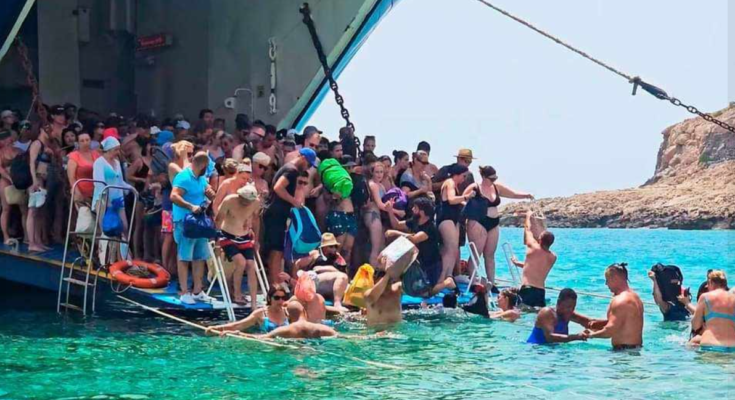Greece is expected to break the record in the number of tourists visiting the country this year, but they spend less than before, according to recent data from the Bank of Greece.
Figures showed tourism revenues in May increased by 6.8 percent and arrivals jumped 21.1 percent before the peak period but that the average spending per trip fell 12.2 percent.
The overall increase in revenues was attributed to the greater numbers coming as the average expenditure per person has dropped sharply despite soaring prices for accommodations, food, drinks, and other commodities favored by tourists.
The trend, the bank report indicated, began in the autumn of 2023. It showed that international travelers spent an average of 570.70 euros ($618.23) per trip, a drop of 3.5 percent or 21 euros ($22.75) compared to 2022.
Visitors aren’t staying as long as before either, cutting their trips short. Worries mount that blistering heat waves could also see the number of arrivals begin to drop if travelers go to cooler climes. The average length of stay in 2023 fell 11.2 percent.
The 7 percent decline in average spending per trip is worrisome given inflation and sharp rises in prices for goods and services in the last two years, with tourism areas so expensive many Greeks can’t vacation there anymore.
The report suggested the drop in tourist spending is because of rising airline and ferry prices. Traveling to Greek islands is now out of reach for many families. There has been more discriminatory spending, and Greeks are taking shorter vacations.
More tourists leads to overtourism in Greece
Overtourism is forcing Greece to take significant measures to curb the number of cruise ship arrivals in the busy ports of Piraeus, Mykonos, and Santorini. Greek Prime Minister Kyriakos Mitsotakis said it is imperative to take measures to cap the number of cruise ships arriving daily in Greece’s most popular travel destinations.
Greece, renowned for its idyllic islands and ancient history, is concerned over the influx of cruise ships that often create chaos and overcrowding, making it difficult for visitors to enjoy themselves and disrupting locals’ everyday lives.
Prime Minister Kyriakos Mitsotakis told Bloomberg in June that he is considering restrictions on cruise ships either through the use of a “cutter” on the total number of berths on popular destinations or by introducing a tendering process for time slots.
Greece is not the first Mediterranean country to be forced to take action against the effects of massive tourist arrivals in certain destinations. In 2021, Italy banned large cruise ships from entering the canal leading to Venice’s historic center. This was decided because of damage from overtourism. Moreover, day-trippers are now charged a toll to enter the center during peak periods.



